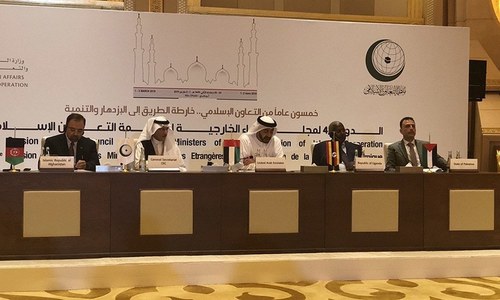NOTWITHSANDING the positive outcome of the two-day conference of Islamic foreign ministers in Niger’s capital last month, Pakistan need not be euphoric nor forget some of the fundamental differences between our pan-Islamic sentiments and those of the other members of the Organisation of Islamic Cooperation which are a little less zealous about it. At the same time, let us not confuse the ummah with the OIC. The two are not synonyms.
The ummah comprises world Muslims linked through an unshakable bond of belief and emotions peculiar to Muslims; the OIC consists mostly of unelected governments of 50-plus member states which may or may not share common interests because of differences in geography, ethnography and historical experience. Even the 22 members of the Arab League do not have a common perception of geopolitical issues and are sometimes at loggerheads, as can be seen in their policies on the slaughter in Syria, Yemen and Libya.
One point should, however, be grasped at the outset. The Arab world is the pivot on which the ummah turns. Without the Arabs and their language there is no ummah. This is a harsh geopolitical and historical reality, and if one finds Arab governments indifferent to non-Arab issues — even tragedies like Kashmir and Rohingya — then one can only pray.
There is another bitter observation: the average Arab cannot understand how people — eg those millions of Indonesians, South Asians, Kazakhs or Bosnians — can be Muslim if they do not speak the language of the Holy Quran.
What is this lame-duck organisation good for?
The Arabs are a proud people. Their belief in the superiority of their language and their consciousness of Arabs’ cultural achievements in history shape their lackadaisical attitude towards all non-Arab Muslims. Toward Turks and Iranians — the only two ethnic groups they have interacted with for more than a millennium — their approach is more complex. ‘Turks’ here doesn’t mean Ottomans alone; it also means the variety of Turco-Mongols who ruled the Middle East for nearly 1,000 years — the Seljuks, Mamluks, Il-Khans, White Sheep and Black Sheep, Circassians, Timurids and Turco-Albanians. One reason for Arab indifference to the Turkic people is their bitter memory of the way the Timurids and some Mamluks dealt with them.
In the case of Iran, they draw satisfaction from the fact that it was the Arabs who ruled Iran and changed its culture. However, the fact that Shia Islam became Iran’s state religion from the early 16th century onwards has made no difference to Shia Arabs. Note that Iraq is a Shia-majority country and Saddam Hussein’s army which attacked Iran was largely Shia.
Getting down to brass tacks, it was the UAE which gave two blows to Pakistan last year. In March, it hosted at Abu Dhabi the 46th OIC foreign ministers’ conference, which the late Indian foreign minister, Sushma Swaraj, attended as an honoured guest. Later that year, it could have come up with a stronger denunciation of the Indian move to abolish India-held Kashmir’s special status and amendment to the nationality law. The entire Arab world was indifferent.
Must we be so OIC-oriented? What is this lame-duck organisation good for? It doesn’t even have non-political achievements to its credit. No country in the world attaches so much importance to it as Pakistan does for reasons which are visceral and not grounded in geopolitical realities. India, too, watches the OIC carefully and derives sadistic pleasure from Pakistan’s discomfiture. (India enjoys observer status at the Arab League.)
Let Pakistan shirk any attempt at creating a non-Arab bloc. In the first place this will only widen the gulf between Arab and non-Arab governments without advancing any cause. Secondly, the fate of the abortive non-Arab mini summit at Kuala Lumpur last December is before us. Whether or not the Saudis threatened Pakistan, the way Recep Tayyip Erdogan is reported to have put it is immaterial. Arabs are too powerful to be ignored, centrally placed geographically and endowed historically with leadership heritage. The realistic course for Pakistan is to ignore the OIC and treat it as a debating forum.
The Arabs are basically a secular people. A native of Damascus or Cairo is first a Syrian or Egyptian, then an Arab and lastly a Muslim. He is impervious to non-Arab overtures on a religious basis. In fact, he is suspicious as to the motive. Islam is in his blood, and unlike us Pakistanis he doesn’t flaunt it.
Let’s accept it. Our ‘we Muslims’ obsession, which is a continuation of our pre-Partition anguish about Muslims in other countries, has largely remained unreciprocated. If we want respect from the OIC and the world, let Pakistanis first give some respect to each other. Let Pakistanis hate each other a little less. Let us develop the ‘Pakistan comes first’ narrative, eclipsed unfortunately by elements that have terrorised Pakistan into becoming a base for an international jihadist movement.
The writer is Dawn’s external ombudsman and an author.
Published in Dawn, December 22nd, 2020


































